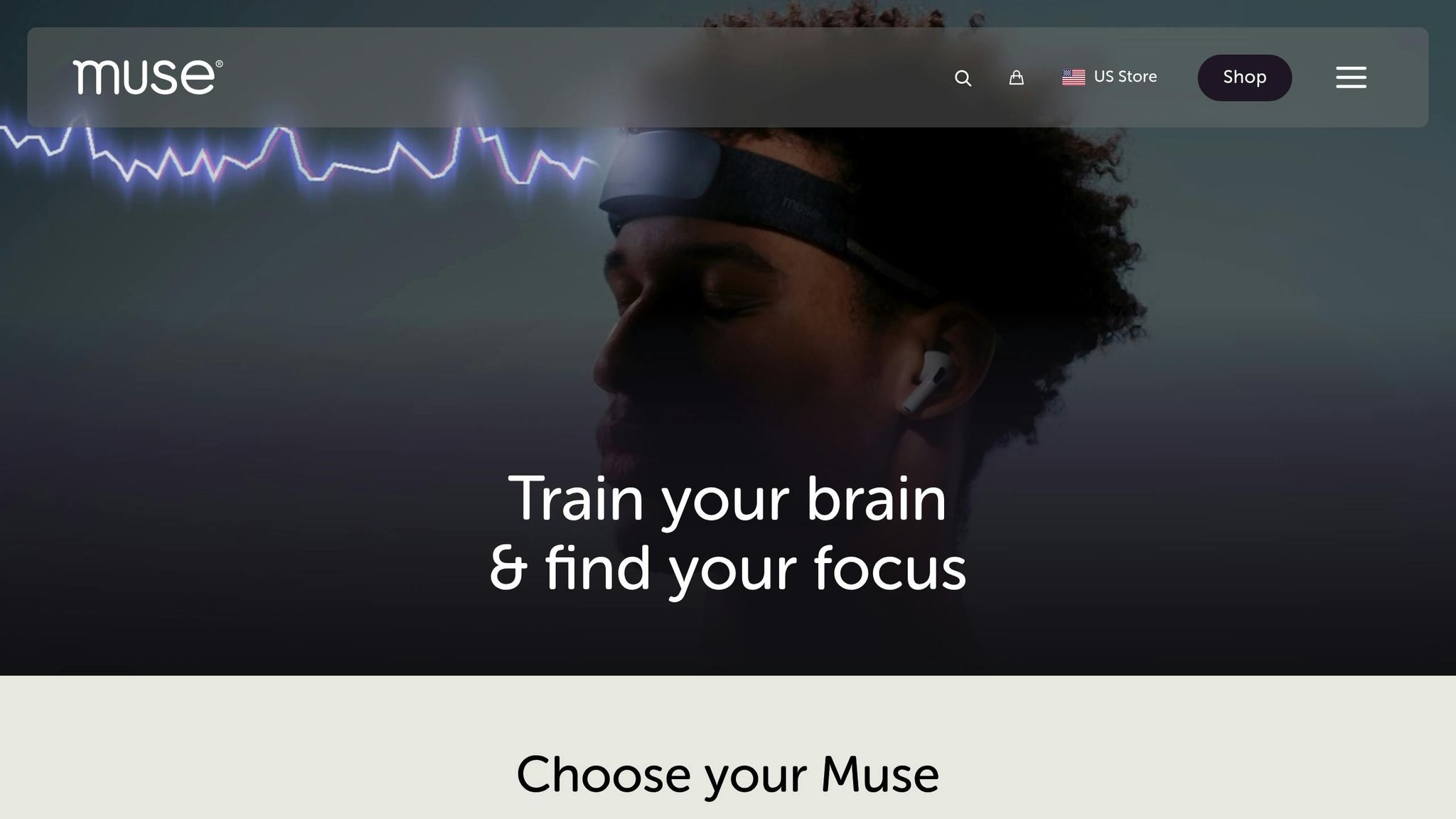Want better sleep and healthier aging? Start tracking your sleep in real time. By monitoring key biomarkers - like brain waves, heart rate, breathing, and body temperature - you can improve sleep quality, spot disruptions early, and support long-term health.
Key Takeaways:
- Brain Activity (EEG): Tracks sleep stages like light, deep, and REM sleep.
- Heart Rate & HRV: Lower heart rate and stable HRV indicate deep sleep, while fluctuations occur during REM.
- Breathing Patterns: Irregularities may signal issues like sleep apnea.
- Sleep Devices: Options range from medical-grade EEGs (most accurate) to wearables like smart rings and watches.
Quick Comparison of Sleep Tracking Tools:
| Device | Biomarkers Tracked | Accuracy |
|---|---|---|
| Medical EEG | Brain waves, muscle activity | 95-98% |
| Smart Rings | Heart rate, temperature | 85-90% |
| Smart Watches | Heart rate, SpO2, movement | 80-85% |
| Smart Mattresses | Breathing, heart rate | 75-80% |
Why it matters: Quality sleep triggers cellular repair, strengthens immunity, and slows biological aging. Pairing sleep tracking with supplements like NMN or Resveratrol can further support healthy aging.
How AI is Transforming Sleep: A Webinar with Muse AI ...

Sleep Stage Biomarkers
Sleep stage biomarkers offer insights into how sleep cycles progress and their overall quality. These metrics help distinguish between sleep phases and identify disruptions, forming the basis for detailed sleep analysis.
Brain Activity (EEG) Patterns
Electroencephalogram (EEG) readings capture unique brain wave patterns tied to different sleep stages:
| Sleep Stage | Brain Wave Pattern | Frequency Range | Characteristics |
|---|---|---|---|
| Light Sleep (N1) | Alpha & Theta | 4-8 Hz | Mixed frequency, low amplitude |
| Deep Sleep (N2) | Sleep Spindles & K-complexes | 11-16 Hz | Sudden high-amplitude waves |
| Slow Wave (N3) | Delta | 0.5-4 Hz | High amplitude, slow waves |
| REM Sleep | Beta | 15-30 Hz | Similar to waking brain activity |
These patterns are key to identifying and classifying sleep stages accurately.
Heart Rate and HRV Measurements
Heart rate and heart rate variability (HRV) shift predictably across sleep stages, providing real-time insights into sleep transitions and quality:
- Heart rate decreases while HRV increases.
- Deep Sleep: Heart rate hits its lowest point, and HRV becomes stable.
- REM Sleep: Heart rate fluctuates, and HRV shows irregular patterns.
These metrics can also flag disruptions. For example, an unusually high heart rate during deep sleep might suggest stress or a sleep disorder.
Breathing Patterns
Respiratory metrics reveal important details about sleep quality and potential breathing disorders:
| Breathing Metric | Normal Range | Indicator |
|---|---|---|
| Respiratory Rate | 12-20 breaths/min | Slows during deep sleep |
| Oxygen Saturation | 95-100% | Drops may signal apnea |
| Breathing Effort | Consistent | Irregularity suggests disruptions |
Shifts in breathing patterns often align with sleep stage transitions and can highlight conditions like sleep apnea. Continuous monitoring is essential for detecting such issues early.
sbb-itb-4f17e23
Sleep Monitoring Tools
Modern sleep tracking technology uses advanced sensors and analytics to measure key sleep-related biomarkers. These tools vary from consumer-friendly wearables to clinical-grade devices, each offering different levels of precision and features.
Sleep Tracking Devices
Today's devices gather detailed sleep data using a variety of sensors:
| Device Type | Features | Biomarker Tracking | Accuracy Level |
|---|---|---|---|
| Medical EEG | Multiple electrodes, clinical sensors | Brain waves, muscle activity | 95-98% |
| Smart Rings | Compact, designed for continuous wear | Heart rate, temperature, movement | 85-90% |
| Smart Watches | All-day tracking, multifunctional | Heart rate, movement, SpO2 | 80-85% |
| Smart Mattresses | Non-wearable, passive monitoring | Movement, breathing, heart rate | 75-80% |
Accuracy depends on sensor quality and placement. Medical-grade EEG devices are the most reliable for sleep stage analysis, while consumer devices provide practical, everyday tracking options. These tools generate large datasets that specialized software processes into useful insights.
Sleep Analysis Software
Sophisticated algorithms process raw biomarker data to deliver detailed sleep insights. Key capabilities of modern sleep analysis software include:
- Real-time Processing: Analyzes data as you sleep for immediate insights.
- Pattern Recognition: Uses machine learning to detect trends in sleep data.
- Anomaly Detection: Flags irregular patterns or potential sleep disorders.
By combining data from multiple sources, these systems produce detailed reports that cover both nightly sleep quality and long-term trends.
Sleep Tracking Apps
Once processed by software, sleep tracking apps turn complex data into easy-to-understand visuals and metrics. These apps offer features like:
| Feature | Purpose | User Benefit |
|---|---|---|
| Sleep Stage Graphs | Displays sleep cycles visually | Simplifies understanding of sleep patterns |
| Biomarker Trends | Shows historical data over time | Helps spot long-term changes |
| Smart Alarms | Optimizes wake-up timing | Promotes waking during light sleep |
| Sleep Score | Provides a quick quality overview | Makes daily assessments convenient |
Most apps sync across devices for a seamless experience. They often include educational resources to help users interpret their data and adjust their habits for better sleep.
Sleep Data and Longevity
Sleep data, combined with biomarker tracking, has become a key focus for understanding how sleep impacts longevity.
Improving Sleep Quality
Real-time sleep biomarkers help identify disruptions and provide targeted ways to improve sleep. Metrics like heart rate variability (HRV) and breathing patterns offer valuable insights.
Here’s how specific sleep metrics guide improvements:
| Sleep Metric | What It Reveals | How to Improve |
|---|---|---|
| Deep Sleep Duration | Efficiency of cellular repair | Keep room temperatures at 65-67°F |
| REM Sleep Cycles | Memory and learning processes | Stick to a consistent sleep schedule |
| Sleep Latency | Time taken to fall asleep | Practice relaxation before bed |
| Sleep Continuity | Frequency of disruptions | Use sound masking and control light |
These insights not only enhance sleep but also play a role in slowing aging-related processes.
Sleep's Impact on Aging
Deep sleep triggers the body’s natural repair systems, helping maintain cellular health. Poor sleep, on the other hand, disrupts these processes, speeding up biological aging.
Research highlights the benefits of consistent, high-quality sleep:
- Supports cellular repair and strengthens immune function
- Aids in hormone balance and cellular waste removal
MASI Longevity Science Sleep Support

Improving sleep quality naturally supports cellular repair, a process further enhanced by MASI’s supplements. These products are specifically designed to target cellular processes tied to both sleep and aging.
"At MASI, we pride ourselves on offering the purest and highest quality products to support your health and longevity journey. Our supplements are manufactured to a standard not yet seen in the industry, setting a new benchmark for product quality. The MASI benchmark." - MASI Longevity Science [1]
For the best results, MASI provides age-specific dosing recommendations:
| Age Group | Recommended Daily Dosage |
|---|---|
| 40-50 years | 1 capsule |
| 50+ years | 2 capsules |
MASI’s supplements, including NMN, Resveratrol, Fisetin, and Spermidine, are crafted from premium raw materials in Germany and undergo rigorous purity testing in Switzerland. These supplements, combined with quality sleep, help promote cellular renewal and support healthy aging [1].
Conclusion
Tracking biomarkers in real time plays a key role in improving sleep and supporting long-term health. By monitoring factors like brain activity, heart rate variability, and breathing patterns, we can better understand how sleep impacts cellular health and overall well-being.
Quality sleep is essential for the body's natural repair processes, which influence how we age. This approach to sleep monitoring reflects MASI Longevity Science's focus on using research-backed methods to promote better health outcomes.
"MASI follows the guidance of leading longevity experts worldwide, including Harvard Medical School and Mayo Clinic professors, to craft premium longevity supplements from German materials, rigorously tested in Switzerland" [1]
MASI's supplements are designed to complement these findings, offering NMN, Resveratrol, Fisetin, and Spermidine formulations that support cellular repair and healthy aging. Paired with quality sleep, they aim to promote optimal cellular renewal.




